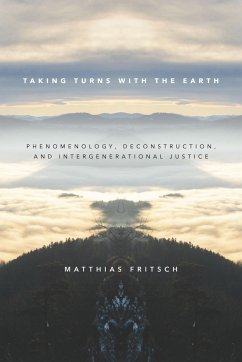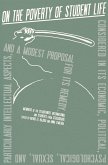Matthias Fritsch
Taking Turns with the Earth
Phenomenology, Deconstruction, and Intergenerational Justice
Matthias Fritsch
Taking Turns with the Earth
Phenomenology, Deconstruction, and Intergenerational Justice
- Broschiertes Buch
- Merkliste
- Auf die Merkliste
- Bewerten Bewerten
- Teilen
- Produkt teilen
- Produkterinnerung
- Produkterinnerung
Reconsidering the natality and mortality of the human condition, this book offers novel conceptions of intergenerational justice in terms of reciprocities and the taking of turns among generations.
Andere Kunden interessierten sich auch für
![Taking Turns: Stories from HIV/AIDS Care Unit 371 Taking Turns: Stories from HIV/AIDS Care Unit 371]() MK Czerwiec (Creative Writing Adjunct Professor / Artist-in-ResideTaking Turns: Stories from HIV/AIDS Care Unit 37122,99 €
MK Czerwiec (Creative Writing Adjunct Professor / Artist-in-ResideTaking Turns: Stories from HIV/AIDS Care Unit 37122,99 €![And Still The Earth Turns And Still The Earth Turns]() Muhammad Ali BandialAnd Still The Earth Turns13,99 €
Muhammad Ali BandialAnd Still The Earth Turns13,99 €![When the Moon Turns to Blood When the Moon Turns to Blood]() Leah SottileWhen the Moon Turns to Blood28,99 €
Leah SottileWhen the Moon Turns to Blood28,99 €![When the Moon Turns to Blood When the Moon Turns to Blood]() Leah SottileWhen the Moon Turns to Blood18,99 €
Leah SottileWhen the Moon Turns to Blood18,99 €![The Moon That Turns You Back The Moon That Turns You Back]() Hala AlyanThe Moon That Turns You Back17,99 €
Hala AlyanThe Moon That Turns You Back17,99 €![On the Poverty of Student Life On the Poverty of Student Life]() Mustapha KhayatiOn the Poverty of Student Life22,99 €
Mustapha KhayatiOn the Poverty of Student Life22,99 €![It All Turns on Affection It All Turns on Affection]() Wendell BerryIt All Turns on Affection15,99 €
Wendell BerryIt All Turns on Affection15,99 €-
-
-
Reconsidering the natality and mortality of the human condition, this book offers novel conceptions of intergenerational justice in terms of reciprocities and the taking of turns among generations.
Hinweis: Dieser Artikel kann nur an eine deutsche Lieferadresse ausgeliefert werden.
Hinweis: Dieser Artikel kann nur an eine deutsche Lieferadresse ausgeliefert werden.
Produktdetails
- Produktdetails
- Verlag: Stanford University Press
- Seitenzahl: 280
- Erscheinungstermin: 2. Oktober 2018
- Englisch
- Abmessung: 226mm x 154mm x 22mm
- Gewicht: 442g
- ISBN-13: 9781503606951
- ISBN-10: 1503606953
- Artikelnr.: 50908771
- Herstellerkennzeichnung
- Libri GmbH
- Europaallee 1
- 36244 Bad Hersfeld
- gpsr@libri.de
- Verlag: Stanford University Press
- Seitenzahl: 280
- Erscheinungstermin: 2. Oktober 2018
- Englisch
- Abmessung: 226mm x 154mm x 22mm
- Gewicht: 442g
- ISBN-13: 9781503606951
- ISBN-10: 1503606953
- Artikelnr.: 50908771
- Herstellerkennzeichnung
- Libri GmbH
- Europaallee 1
- 36244 Bad Hersfeld
- gpsr@libri.de
Matthias Fritsch is Professor of Philosophy at Concordia University.
Contents and Abstracts
1Ontological Problems and Methods in Intergenerational Justice
chapter abstract
This chapter begins by reviewing the so-called ontological problems that
affect relations with future people, from the nonexistence challenge and
poor epistemic access to problems affecting interaction and world
constitution. It is then argued that ontological problems call for
ontological solutions-here, investigations of moral agents' being in
relation to time and world. Drawing on phenomenological sources, the
chapter provides a first sketch of the book's overarching claim that
justice becomes an issue for human beings to the extent we are generational
beings who are noncontingently subject to birth and death. Birth and death,
the argument continues, link us to previous and subsequent generations in
ways that are socially and morally relevant. If we take this into account,
the dead and the unborn will appear less absent and more (albeit
"spectrally") present. The chapter ends by outlining possible responses to
many of the ontological problems.
2Levinas's "Being-for-Beyond-My-Death"
chapter abstract
The second chapter elaborates the constitutive role of natality and
mortality, sketched in the previous chapter, in much greater detail, with
particular focus on Levinas. In the wake of Heidegger and others, Levinas
argues that, in accessing the finite time that is co-disclosive of agency,
I necessarily encounter the mortal, vulnerable other whose face demands
that I let the other live. Agency is co-constituted by a futural demand to
let others have possibilities for life beyond my death. Thus, the demand
from actual future people on the living comes to be seen as exemplary of
moral normativity. However, Levinas insufficiently links this futural
responsibility to debts to previous others (including mothers), drawing
legitimate feminist and Derridean critiques of his "fecundity" and
"paternity." The chapter concludes that the moral demand cannot just be
futural but must also be related to gifts from predecessors.
3Asymmetrical Reciprocity and the Gift in Mauss and Derrida
chapter abstract
Taking off from the insight offered at the end of the previous chapter,
this chapter elaborates indirect, asymmetrical reciprocity as a model of
intergenerational justice. This notion is meant to capture the idea that
indebtedness to preceding others plays a role in giving to future others,
no matter how asymmetrical and altruistic the gift to future people is
taken to be. With this goal in view, the chapter connects Derrida's
critical reading of Levinas to economic literature on intergenerational
transfers, specifically economists who draw on the premodern, indigenous
notion of the gift, as famously elaborated by the anthropologist Marcel
Mauss. The chapter distinguishes four (ideal) types of intergenerational
three-party reciprocities and concludes that the notion of the gift points
to the enabling conditions of economic activity. Both gifts of nature and
benefits from nonpresent generations belong to these conditions, conditions
that are too often "externalized" by market economies.
4Double Turn-Taking among Generations and with Earth
chapter abstract
With this topic of collectively shared goods in mind, the fourth chapter
presents turn-taking as the second model of intergenerational justice that
elaborates the "spectral" presence of nonpresent generations. Taking turns
is more appropriate than reciprocity when the "object" of intergenerational
sharing, in particular the natural environment and democratic institutions,
is quasi-holistic and organically interrelated, such that it cannot easily
be divided into parts nor can parts be substituted for one another. Drawing
on Derrida's work on time and democracy, this model's distinct advantages
are discussed in view of answering the question as to what a fair turn with
earth and future people might be. The chapter concludes by showing that
quasi-holistic objects such as earth and climate necessarily precede and
outlive generations, and thus are not indifferent to, but co-constitutive
of, the very being of generations, the subjects of sharing by turn-taking.
5Interment
chapter abstract
To avoid the humanism that takes the earth to be an indifferent object of
intergenerational sharing, the final chapter complicates taking turns by
arguing that the earth, understood as the history and habitat of life, for
its part turns human beings about. We do not only have human generations
taking turns with the earth, but individuals being born of the earth into a
generation, while returning to the earth upon death. Humans are both
"interred'" (agonistically belonging to a larger time and space here called
the earth) and "interring" (responsible for returning others to the earth,
as in burial).
1Ontological Problems and Methods in Intergenerational Justice
chapter abstract
This chapter begins by reviewing the so-called ontological problems that
affect relations with future people, from the nonexistence challenge and
poor epistemic access to problems affecting interaction and world
constitution. It is then argued that ontological problems call for
ontological solutions-here, investigations of moral agents' being in
relation to time and world. Drawing on phenomenological sources, the
chapter provides a first sketch of the book's overarching claim that
justice becomes an issue for human beings to the extent we are generational
beings who are noncontingently subject to birth and death. Birth and death,
the argument continues, link us to previous and subsequent generations in
ways that are socially and morally relevant. If we take this into account,
the dead and the unborn will appear less absent and more (albeit
"spectrally") present. The chapter ends by outlining possible responses to
many of the ontological problems.
2Levinas's "Being-for-Beyond-My-Death"
chapter abstract
The second chapter elaborates the constitutive role of natality and
mortality, sketched in the previous chapter, in much greater detail, with
particular focus on Levinas. In the wake of Heidegger and others, Levinas
argues that, in accessing the finite time that is co-disclosive of agency,
I necessarily encounter the mortal, vulnerable other whose face demands
that I let the other live. Agency is co-constituted by a futural demand to
let others have possibilities for life beyond my death. Thus, the demand
from actual future people on the living comes to be seen as exemplary of
moral normativity. However, Levinas insufficiently links this futural
responsibility to debts to previous others (including mothers), drawing
legitimate feminist and Derridean critiques of his "fecundity" and
"paternity." The chapter concludes that the moral demand cannot just be
futural but must also be related to gifts from predecessors.
3Asymmetrical Reciprocity and the Gift in Mauss and Derrida
chapter abstract
Taking off from the insight offered at the end of the previous chapter,
this chapter elaborates indirect, asymmetrical reciprocity as a model of
intergenerational justice. This notion is meant to capture the idea that
indebtedness to preceding others plays a role in giving to future others,
no matter how asymmetrical and altruistic the gift to future people is
taken to be. With this goal in view, the chapter connects Derrida's
critical reading of Levinas to economic literature on intergenerational
transfers, specifically economists who draw on the premodern, indigenous
notion of the gift, as famously elaborated by the anthropologist Marcel
Mauss. The chapter distinguishes four (ideal) types of intergenerational
three-party reciprocities and concludes that the notion of the gift points
to the enabling conditions of economic activity. Both gifts of nature and
benefits from nonpresent generations belong to these conditions, conditions
that are too often "externalized" by market economies.
4Double Turn-Taking among Generations and with Earth
chapter abstract
With this topic of collectively shared goods in mind, the fourth chapter
presents turn-taking as the second model of intergenerational justice that
elaborates the "spectral" presence of nonpresent generations. Taking turns
is more appropriate than reciprocity when the "object" of intergenerational
sharing, in particular the natural environment and democratic institutions,
is quasi-holistic and organically interrelated, such that it cannot easily
be divided into parts nor can parts be substituted for one another. Drawing
on Derrida's work on time and democracy, this model's distinct advantages
are discussed in view of answering the question as to what a fair turn with
earth and future people might be. The chapter concludes by showing that
quasi-holistic objects such as earth and climate necessarily precede and
outlive generations, and thus are not indifferent to, but co-constitutive
of, the very being of generations, the subjects of sharing by turn-taking.
5Interment
chapter abstract
To avoid the humanism that takes the earth to be an indifferent object of
intergenerational sharing, the final chapter complicates taking turns by
arguing that the earth, understood as the history and habitat of life, for
its part turns human beings about. We do not only have human generations
taking turns with the earth, but individuals being born of the earth into a
generation, while returning to the earth upon death. Humans are both
"interred'" (agonistically belonging to a larger time and space here called
the earth) and "interring" (responsible for returning others to the earth,
as in burial).
Contents and Abstracts
1Ontological Problems and Methods in Intergenerational Justice
chapter abstract
This chapter begins by reviewing the so-called ontological problems that
affect relations with future people, from the nonexistence challenge and
poor epistemic access to problems affecting interaction and world
constitution. It is then argued that ontological problems call for
ontological solutions-here, investigations of moral agents' being in
relation to time and world. Drawing on phenomenological sources, the
chapter provides a first sketch of the book's overarching claim that
justice becomes an issue for human beings to the extent we are generational
beings who are noncontingently subject to birth and death. Birth and death,
the argument continues, link us to previous and subsequent generations in
ways that are socially and morally relevant. If we take this into account,
the dead and the unborn will appear less absent and more (albeit
"spectrally") present. The chapter ends by outlining possible responses to
many of the ontological problems.
2Levinas's "Being-for-Beyond-My-Death"
chapter abstract
The second chapter elaborates the constitutive role of natality and
mortality, sketched in the previous chapter, in much greater detail, with
particular focus on Levinas. In the wake of Heidegger and others, Levinas
argues that, in accessing the finite time that is co-disclosive of agency,
I necessarily encounter the mortal, vulnerable other whose face demands
that I let the other live. Agency is co-constituted by a futural demand to
let others have possibilities for life beyond my death. Thus, the demand
from actual future people on the living comes to be seen as exemplary of
moral normativity. However, Levinas insufficiently links this futural
responsibility to debts to previous others (including mothers), drawing
legitimate feminist and Derridean critiques of his "fecundity" and
"paternity." The chapter concludes that the moral demand cannot just be
futural but must also be related to gifts from predecessors.
3Asymmetrical Reciprocity and the Gift in Mauss and Derrida
chapter abstract
Taking off from the insight offered at the end of the previous chapter,
this chapter elaborates indirect, asymmetrical reciprocity as a model of
intergenerational justice. This notion is meant to capture the idea that
indebtedness to preceding others plays a role in giving to future others,
no matter how asymmetrical and altruistic the gift to future people is
taken to be. With this goal in view, the chapter connects Derrida's
critical reading of Levinas to economic literature on intergenerational
transfers, specifically economists who draw on the premodern, indigenous
notion of the gift, as famously elaborated by the anthropologist Marcel
Mauss. The chapter distinguishes four (ideal) types of intergenerational
three-party reciprocities and concludes that the notion of the gift points
to the enabling conditions of economic activity. Both gifts of nature and
benefits from nonpresent generations belong to these conditions, conditions
that are too often "externalized" by market economies.
4Double Turn-Taking among Generations and with Earth
chapter abstract
With this topic of collectively shared goods in mind, the fourth chapter
presents turn-taking as the second model of intergenerational justice that
elaborates the "spectral" presence of nonpresent generations. Taking turns
is more appropriate than reciprocity when the "object" of intergenerational
sharing, in particular the natural environment and democratic institutions,
is quasi-holistic and organically interrelated, such that it cannot easily
be divided into parts nor can parts be substituted for one another. Drawing
on Derrida's work on time and democracy, this model's distinct advantages
are discussed in view of answering the question as to what a fair turn with
earth and future people might be. The chapter concludes by showing that
quasi-holistic objects such as earth and climate necessarily precede and
outlive generations, and thus are not indifferent to, but co-constitutive
of, the very being of generations, the subjects of sharing by turn-taking.
5Interment
chapter abstract
To avoid the humanism that takes the earth to be an indifferent object of
intergenerational sharing, the final chapter complicates taking turns by
arguing that the earth, understood as the history and habitat of life, for
its part turns human beings about. We do not only have human generations
taking turns with the earth, but individuals being born of the earth into a
generation, while returning to the earth upon death. Humans are both
"interred'" (agonistically belonging to a larger time and space here called
the earth) and "interring" (responsible for returning others to the earth,
as in burial).
1Ontological Problems and Methods in Intergenerational Justice
chapter abstract
This chapter begins by reviewing the so-called ontological problems that
affect relations with future people, from the nonexistence challenge and
poor epistemic access to problems affecting interaction and world
constitution. It is then argued that ontological problems call for
ontological solutions-here, investigations of moral agents' being in
relation to time and world. Drawing on phenomenological sources, the
chapter provides a first sketch of the book's overarching claim that
justice becomes an issue for human beings to the extent we are generational
beings who are noncontingently subject to birth and death. Birth and death,
the argument continues, link us to previous and subsequent generations in
ways that are socially and morally relevant. If we take this into account,
the dead and the unborn will appear less absent and more (albeit
"spectrally") present. The chapter ends by outlining possible responses to
many of the ontological problems.
2Levinas's "Being-for-Beyond-My-Death"
chapter abstract
The second chapter elaborates the constitutive role of natality and
mortality, sketched in the previous chapter, in much greater detail, with
particular focus on Levinas. In the wake of Heidegger and others, Levinas
argues that, in accessing the finite time that is co-disclosive of agency,
I necessarily encounter the mortal, vulnerable other whose face demands
that I let the other live. Agency is co-constituted by a futural demand to
let others have possibilities for life beyond my death. Thus, the demand
from actual future people on the living comes to be seen as exemplary of
moral normativity. However, Levinas insufficiently links this futural
responsibility to debts to previous others (including mothers), drawing
legitimate feminist and Derridean critiques of his "fecundity" and
"paternity." The chapter concludes that the moral demand cannot just be
futural but must also be related to gifts from predecessors.
3Asymmetrical Reciprocity and the Gift in Mauss and Derrida
chapter abstract
Taking off from the insight offered at the end of the previous chapter,
this chapter elaborates indirect, asymmetrical reciprocity as a model of
intergenerational justice. This notion is meant to capture the idea that
indebtedness to preceding others plays a role in giving to future others,
no matter how asymmetrical and altruistic the gift to future people is
taken to be. With this goal in view, the chapter connects Derrida's
critical reading of Levinas to economic literature on intergenerational
transfers, specifically economists who draw on the premodern, indigenous
notion of the gift, as famously elaborated by the anthropologist Marcel
Mauss. The chapter distinguishes four (ideal) types of intergenerational
three-party reciprocities and concludes that the notion of the gift points
to the enabling conditions of economic activity. Both gifts of nature and
benefits from nonpresent generations belong to these conditions, conditions
that are too often "externalized" by market economies.
4Double Turn-Taking among Generations and with Earth
chapter abstract
With this topic of collectively shared goods in mind, the fourth chapter
presents turn-taking as the second model of intergenerational justice that
elaborates the "spectral" presence of nonpresent generations. Taking turns
is more appropriate than reciprocity when the "object" of intergenerational
sharing, in particular the natural environment and democratic institutions,
is quasi-holistic and organically interrelated, such that it cannot easily
be divided into parts nor can parts be substituted for one another. Drawing
on Derrida's work on time and democracy, this model's distinct advantages
are discussed in view of answering the question as to what a fair turn with
earth and future people might be. The chapter concludes by showing that
quasi-holistic objects such as earth and climate necessarily precede and
outlive generations, and thus are not indifferent to, but co-constitutive
of, the very being of generations, the subjects of sharing by turn-taking.
5Interment
chapter abstract
To avoid the humanism that takes the earth to be an indifferent object of
intergenerational sharing, the final chapter complicates taking turns by
arguing that the earth, understood as the history and habitat of life, for
its part turns human beings about. We do not only have human generations
taking turns with the earth, but individuals being born of the earth into a
generation, while returning to the earth upon death. Humans are both
"interred'" (agonistically belonging to a larger time and space here called
the earth) and "interring" (responsible for returning others to the earth,
as in burial).








